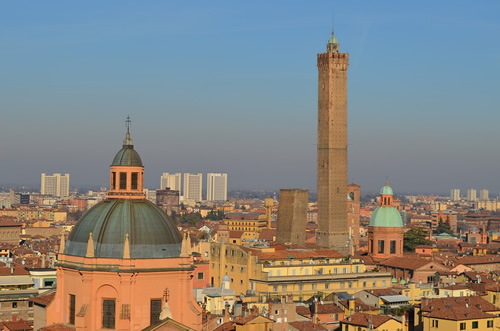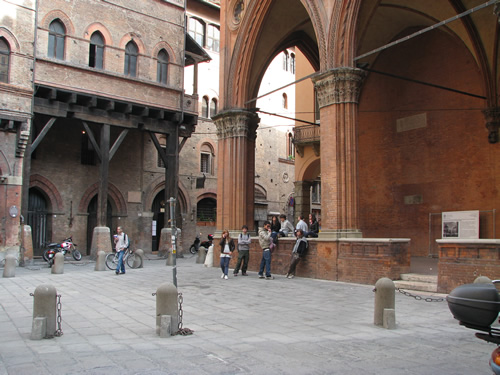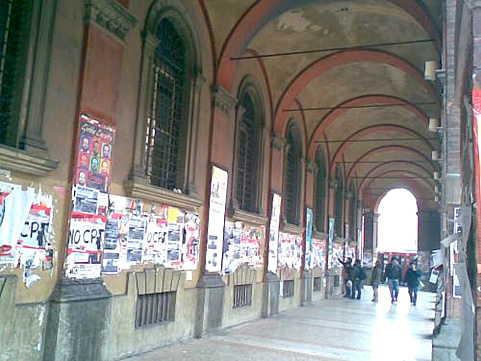How to Enjoy Your Time Studying Abroad in Bologna
By Emily Peeler

|
|
Due Torri: Bologna has its own leaning tower.
|
New Year's Eve: Sitting in a small mountain cabin, I watch my Italian housemates and friends around the smoky wooden interior preparing fresh fish in the fireplace, cooking pasta over a small heater, cutting up fennel, bread, and meat for appetizers, and of course, continually refilling cups with more wine. They mix all the food with their hands, and everyone inherently knows how to cook. These recipes have been passed down for generations in their families, and a recipe book has never been used. It is 11:30 p.m., and I wonder what kind of celebration will occur at midnight. As I should have expected, we rang in the new year, packed around the table, and ate dinner.
If there is any accurate stereotype about Italy, it is the cultural importance placed on food. The entire days revolve around dinner. Every holiday and celebration has a cenone (a really large dinner) as the focal point of the evening. If you ever plan on coming to Italy, there is one rule you must follow: taste everything. But of course, there is much more to Italy than just food.
What to Know About Living in Bologna
The center of Bologna is roughly circular, initially surrounded by an enclosing wall with twelve entrances marked by a porta. The walls have since been torn down, but the twelve entrances remain, creating easy points of reference around the city. Most students choose to live in the center because that is where all university classes take place; it is well connected by bus routes and easy to navigate on foot or bicycle. At the center of town are the two most significant sites, “due torri,” the two central towers, and Piazza Maggiore, a large square nearly always crowded with a (somewhat scandalous) statue of Neptune. Bologna is not really a “siteseeing” kind of city. The best way to see the city is to have a local show you all of the hidden intricacies or live there and find them on your own!

|
|
A typical street scene.
|
I chose to study abroad in Italy because I am studying art history, focusing on Italian Renaissance art. I chose Bologna because it is the oldest university in the Western world and has a large student population. Founded in 1088, the Università di Bologna was the alma mater of many notable personalities such as Dante, Petrarch, and Copernicus, and today there are around 90,000 students. With an overall population of fewer than 400,000 inhabitants, university students comprise over one-fourth of the city. Because the university here is so well-known, students flock from all over Italy as well as all over the world to attend. The university is familiar with exchange students thanks to the ERASMUS+ program (a popular European student exchange program). Thus, most professors know that there are added difficulties for someone who does not know the language well, and many are willing to work with differing requirements, such as altering a reading list or adding an essay. All classes taught at the University of Bologna are in Italian (with a few exceptions), and the grades are based on a final oral exam. Unlike schools in America, finals can be retaken until the student accepts the grade received. There are multiple dates on which a student can take a final, making the school year very fluid and open to the differing schedules of students.
Because of the influx of students from all over Italy, living in Bologna permits exposure to Bolognese culture and the abundance of diverse traditions, particularities, and dialects from all over Italy.
The University of Bologna is not the only academic option; the Accademia di Belle Arti, the Conservatorio di Musica, and the Accademia Nazionale del Cinema exist.
Overcoming Language Barriers
in Bologna
Few people speak English in Bologna. I was glad since one of my goals in Italy was to become fluent in Italian. The major Italian cities such as Florence, Rome, Venice, and Milan make learning Italian difficult because most people speak English. Comparatively, Bologna is a dream for those who desire to improve their Italian. With a basic level of Italian, you can at least order food, buy a train ticket, or find your way around town. However, plan on living with Italians. Finding a deal with such a communication barrier might be difficult. If you think it is challenging and wish to improve your Italian, there are a lot of ways to do so in Bologna for free. The University of Bologna organizes free Italian courses through the University Linguistics Center, CILTA. Some of the Centri Sociali also offer free Italian courses for foreigners. If you prefer one-on-one attention, you can easily arrange a free language exchange with an Italian who wants to learn English. The best way to distribute information is with flyers, so print a bunch with your phone number and post them up around town. It benefits you and the person interested in learning English…and is free! Never forget what a valuable asset you possess — English as a first language.
Additionally, finding an outlet where you can teach English for pay is relatively easy. Several associations are looking for English instructors almost constantly, such as the Cultural Association for Interactive Learning, Centro Didattico Santo Stefano, and the British School of Bologna. Sometimes, you can even get paid to have a conversation in English.
Housing in Bologna
The best way to find housing is to look at posted announcements around town. Italy relies on internet usage less than America does. However, the difference is diminishing, so I would recommend something other than trying to find a place to live online as a first option. However, more and more websites for rentals are up all the time. Every street has ads for an upcoming show, language lessons, apartments, dance courses, etc. Just off the main university street is a long wall bursting with housing ads. You can browse it, pick off a few numbers of apartments, and start the calling processes. The best advice I can give is to be patient and look at many different apartments to be sure you are happy not only with the building itself but also with your future roommates. An apartment may be beautiful, but what good is it if you are unhappy with your roommate? You can live with Italians, international students, or Americans… it is up to you! If you choose to live with Italians (which I highly recommend as it is beneficial for learning Italian through immersion), then make sure you feel the right “vibe” immediately. Your roommates will be your most immediate exposure to Italian culture and lifestyle, so choose wisely.

|
|
A portico in Bologna with posted announcements. Photo by Emily Peeler.
|
Nightlife in Bologna
Bologna always has a lot happening, and with posters and advertisements littering the city, it is easy to find something to do on a Friday night. However, finding something cheap to do is more challenging. Most of the better venues are outside the city center, so getting to and from each club can be an epic journey. Most buses stop running around midnight or 1 a.m., so even though you can take a bus wherever you go, expect to take a taxi home. Additionally, most venues have their own tesera, a special card that you need to enter each club, on top of the entrance fee, which generally is €5-15 (1 euro is approximately equal to US$1.10 at the time of this writing) on a given night, and sometimes more for special concerts and events. If you, like me, don’t have enough money to spend going out to clubs every weekend, don’t fret! There are many ways to have fun in Bologna without spending too much money. Aperitivo, a happy hour with the added benefit of free food, is very common in Bologna. While most Italians treat this as a pre-dinner appetizer, the thrifty American knows this can become a full-blown dinner if necessary. For the price of one drink (usually €4-10), you can get endless mini-sandwiches and lasagna slices, vegetables, meats, cheeses, and bread. Bologna is full of bars in the evenings, from overcrowded ones in the university area to Irish pubs to smaller, more intimate bars on any given side street. You can also find the Centro Sociale, which hosts weekend events to fund their community events during the week. These often have much more reasonable entrance fees (€3-5) and cheap drinks. These locations also often have cheap yoga, pilates, dance classes, free Italian language courses, and political rallies and events.
Food in Bologna
In any discussion of Italy, you cannot leave out the topic of food. It is a central focus of Italian life and particularly good in Bologna. In fact, Bologna is considered the food capital of Italy, earning its title “Bologna la dotta, la grassa, e la rossa.” “La dotta” (the learned) refers to the intellectual atmosphere provided by the university, “la rossa” (the red) refers to the red-colored rooftops all over the city, and “la grassa” (the fat) refers to the long tradition and passion for delicious food. Bologna is well known for mortadella, a sliced meat that’s a more subtle version of what is called “bologna” in America, tortellini, a hand-rolled pasta generally filled with meat, and tagliatelle, a flat pasta often served with meat sauce. Although there are a lot of great restaurants in town, it is much cheaper to buy the ingredients and make these dishes yourself. Italian food is generally relatively simple and has few ingredients — the key is to have quality ingredients which abound throughout Italy. Although the food culture in Bologna is heavily based on meat, it is not impossible to be vegetarian. There are a few vegetarian restaurants and biological markets around town. With the high quality of vegetables, you should have no problem.
No matter what you are interested in — art, food, music, quiet nights in or long nights out dancing — Bologna has something to offer to almost everyone. The key is to go out and find them and never be shy. Italians are generally hospitable, welcoming, curious, and genuinely interested in other cultures, so don’t be afraid to ask questions or talk at the market, in the library, or on the street. Even after six months in Bologna, I am still finding new things to do, latest events to attend, new venues to check out, cafés I never knew existed, and small streets that I swear were not there previously. You will always be amazed at everything Bologna has hidden up its sleeves.
Emily Peeler is originally from Merced, California, and is a senior majoring in History of Art at the University of California, Berkeley.
|
